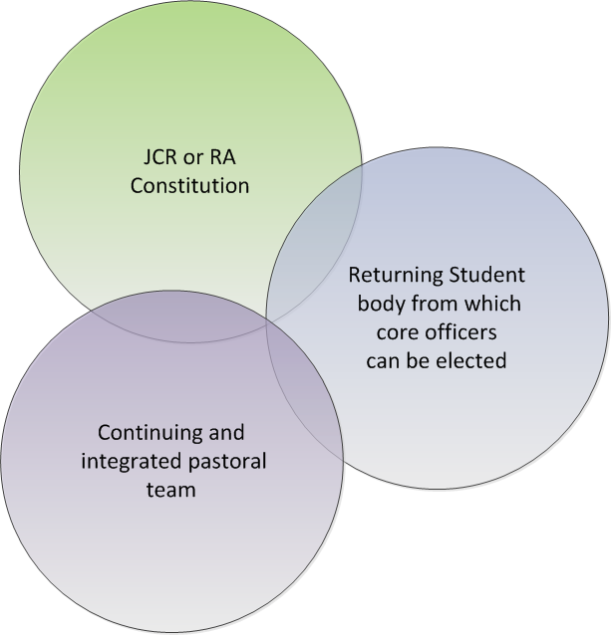
Access to Learning Funds



Following the first meeting last Wednesday, the remaining dates and venues for the Senior Students Council (SSC) for 2013-14 have been set and are as follows:
The SSC has a crucial role to play in underpinning success within the residences as it both supports and disseminates best practices and challenges and questions change, assessing the value and relevance to the halls of residence communities.
During my time as Senior Warden it has become apparent to me that there are three foundation principles that are required for a successful hall in any given year. These are simply illustrated in the diagram below:

Three Foundations Model
A successful hall functions based on the existence of (1) a returning student body with elected committee, (2) a supportive and continuing pastoral team and (3) a robust constitution. The absence of one of these items puts things in jeopardy and requires urgent attention to address the issue. The absence of two leaves the hall in a dire situation that requires a major investment of time, effort and resource to correct and if not addressed does have the potential to destroy a hall within an academic year. The absence of all three leaves a hall in the unenviable situation of having to start from scratch.
By combining the three elements a hall has all the necessary ingredients for success and with a suitable injection of enthusiasm, steer and advice from both experienced pastoral team members and motivated students the potential exists for significant success. Most JCRs and RAs at The University of Manchester have a constitution. These fall into two types: those derived from the UMIST halls and those from the Victoria University of Manchester halls.
Common across these constitutions is the fact that the election of JCRs and RAs around Easter time as is the most successful model and I have been urging pastoral and resident association teams to adopt this model to ensure sustainable hall communities on many levels. As I put it to a colleague recently, how would the Students’ Union function if the last Executive team finished in June and a new Executive was only elected in the 3rd week of October? One reasons that this would be quite disastrous.
As such Easter elections provide the model that ensures a sustainable community is in place and it underpins the effective operation of the hall resident body within the University context. Every effort must be made to try and ensure that it is supported and recognised as best practice.
The variety of the halls and variance in support structures coupled with the absence of instilled cultural values within the student community in many of the larger self-catered halls represents a significant challenge in moving to this model and it will only succeed if it is suitably led as an agreed strategic goal.
Last year working with the SSC and both active and retired wardenial colleagues, a blueprint generic constitution was developed and presents a basis for developing at least one of the foundations needed for success.
This academic year is one of significant change for our students. A new tuition fee regime that has tripled the cost in many universities, above inflation rises in living costs are an often overlooked additional financial burden (simple things like bus fare rises) and many students harbour concerns about future employability. The result of this may be a shift to reading certain degrees that open opportunities to high salary careers, but equally likely is a shift in student focus.
An even greater emphasis is likely to be placed on students having to work to cover the cost of university and trying to balance this with attending lectures, seminars and labs. A good classification degree result now seems an employer essential and students are looking to leverage as much benefit from their time at university as possible. When it comes to the impact on student numbers, the writing was on the wall over the summer and it seems to have been an accurate forecast. More will become clear as the dust finally settles and the situation is fully understood.
From talking to students I know that one of the factors that is very much affecting their decisions is around how the cost of university will be met. In the space of two decades County Council based subsidies of student education have been replaced with a system dependent on student loans, shifting the cost of higher education from the general taxpayer to students. It has arguable now tipped too far and is dependent on an inefficient monopolistic lender, which is perceived by students as offering a poor level of customer service and sending out inaccurate information. The head of the Independent Taskforce on Student Finance Information, Martin Lewis writes:
New research…shows over 60% of school pupils and new university starters worry about not being able to repay their student ‘debt’ after university if they have a low income or lose their job.
Yet this is an irrelevant fear. You only have to repay fees and living costs if you earn over £21,000. And, even then, it’s proportionate to earnings, so you repay 9% of everything above £21,000. If you haven’t cleared what you owe within 30 years, the debt is wiped. For full help on how the system works, read www.moneysavingexpert.com/students2012.
The current situation has been summarised as follows through these headline facts from an Ffrees blog post:
This then seems to be the nitty gritty. It shows that the easy money on offer for students, unsecured and simple to get, should almost certainly come with some kind of health warning.
The Senior Students Council (SSC) is a student group that acts as a sounding board for university decision makers and is an influential body in its own right. The Resident Association (RA) or Junior Common Room (JCR) President or Chairperson of each hall sits on the SSC and brings their local perspectives to a group that truly represents the 9,300 students living in university halls.
By nature it is particularly representative of first year and international student views and general life in halls for all undergraduate and postgraduate students. It was a body that was lost in 2004 during the merger of the two Universities. From discussions with alumni, I felt that not only did it hold great value for the student body, but that it was a valuable way of ensuring more joined up thinking. The reconstitution of the SSC was one my first actions following appointment as Senior Warden for Community Development and Sport and it reformed in late 2010.
The SSC serves to improve awareness of what each hall is doing on an annual basis and to share successes and general information. It represents a very exciting opportunity for all members and is a great advantage for hall communities in planning and coordinating activities and making smart decisions. Of course it also serves as another opportunity for those students involved to state their role on this body within resumes.
The SSC will meets 3 times in each of the two Semesters The SSC dates for this year have been finalised. They are: